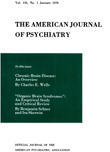The phenomenology of near-death experiences
Abstract
The authors studied retrospectively 78 reports of "near-death experiences using subjects narratives and questionnaires, interviews, and medical records. Prior experiences suggestive of transcendence of death were more common among these subjects than among control populations, but prior experiences suggestive of extrasensory phenomena were less common. Subsequent changes in attitudes were more common than among subjects in other studies who had had psychic experiences. The influence of cultural and psychological factors, sensory deprivation, and reflex adaptive responses to stress explain some but not all of the features of near-death experiences. Their potential value to our conceptualization of dying and to suicide prevention and the care of the terminally ill justifies further investigation.
Access content
To read the fulltext, please use one of the options below to sign in or purchase access.- Personal login
- Institutional Login
- Sign in via OpenAthens
- Register for access
-
Please login/register if you wish to pair your device and check access availability.
Not a subscriber?
PsychiatryOnline subscription options offer access to the DSM-5 library, books, journals, CME, and patient resources. This all-in-one virtual library provides psychiatrists and mental health professionals with key resources for diagnosis, treatment, research, and professional development.
Need more help? PsychiatryOnline Customer Service may be reached by emailing [email protected] or by calling 800-368-5777 (in the U.S.) or 703-907-7322 (outside the U.S.).



